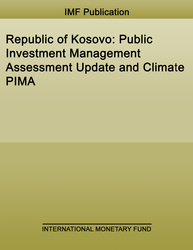
Pakistan: Governance and Corruption Diagnostic Report
This Governance and Corruption Diagnostic (GCD) was conducted at the request and with the support of the Government of Pakistan to identify and analyze governance weaknesses and corruption vulnerabilities that undermine economic performance and reform efforts.
READ MORE...
Volume/Issue:
Volume 2025
Issue 040
Publication date: November 2025
ISBN: 9798229032698
$5.00
Add to Cart by clicking price of the language and format you'd like to purchase
Available Languages and Formats
| English |
Prices in red indicate formats that are not yet available but are forthcoming.
Topics covered in this book
This title contains information about the following subjects.
Click on a subject if you would like to see other titles with the same subjects.
Economics- Macroeconomics , Public Finance , International - Economics , Civics and Citizenship , IMF , Governance Diagnostic , Pakistan , governance , corruption , anti-corruption , governance weakness , corruption risk , Governance and Corruption Diagnostic report , Imf publication , corruption vulnerability , Civil society , Public investment spending
Also of interest
Summary
This Governance and Corruption Diagnostic (GCD) was conducted at the request and with the support of the Government of Pakistan to identify and analyze governance weaknesses and corruption vulnerabilities that undermine economic performance and reform efforts. The diagnostic focused on federal-level governance in five core state functions: fiscal governance, market regulation, financial sector oversight, anti-money laundering and combating the financing of terrorism (AML/CFT), and rule of law, and also considered the strength and effectiveness of anticorruption institutions and approaches to address corruption risks. The findings reveal persistent and widespread corruption risks embedded in a heavily state-dominated economy that operates with complex regulatory environments, weak institutional capacities, fragmented oversight, with ineffective and inconsistent accountability and constrained rule of law. These factors collectively constrain private sector development and public sector effectiveness. The report provides an integrated set of recommendations aimed at achieving concrete and visible progress through strengthening institutional integrity, enhancing transparency, improving consistency and reliability of the enforcement of rules, and fostering coordination across agencies to support sustainable economic growth and public trust.
Copyright © 2010 - 2026
Powered by:
AIDC



